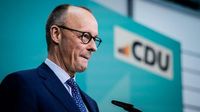Friedrich Merz, the newly appointed leader of Germany's Christian Democratic Union (CDU), is gearing up for a pivotal meeting with U.S. President Donald Trump, although the exact timing remains uncertain. Merz, who has previously expressed confidence in his ability to communicate effectively with Trump, is keen on coordinating with European partners before making the trip to Washington. "I will only travel to Washington when I have gathered a common opinion and stance from our European partners on key political issues," he stated in an interview with BILD.
Merz's approach reflects a strategic mindset as he prepares for what could be a challenging encounter with the unpredictable U.S. president. He has emphasized the importance of understanding and articulating Europe's interests while also being ready to make offers for mutual collaboration. "We need to assert our interests while also making joint offers to exercise those interests together," he remarked.
In light of recent developments, including Trump's decision to suspend tariffs for 90 days, Merz interprets this move as a reaction to potential economic damage to the U.S. economy. He remains a staunch advocate of free trade, asserting, "I am and will remain a strong supporter of free trade, especially in these difficult times." Merz's proposal to eliminate tariffs on both sides, a suggestion previously dismissed by Trump, indicates his willingness to seek compromises.
Despite not having met Trump yet, Merz is optimistic about the future of German-American relations. During a recent press conference, he confidently declared, "Germany is back on track," signaling his readiness to represent European interests assertively. This sentiment aligns with his longstanding belief that Europe must present a united front when engaging with the U.S.
Merz's preparation for this meeting is not merely about personal rapport with Trump; it is rooted in a broader vision for Germany's role in the international arena. He aims to ensure that Germany is not only a stable economic power but also a capable military partner within NATO. His government's plans include increasing defense spending and reinforcing Germany's commitment to NATO's nuclear sharing arrangements.
As the future Chancellor, Merz recognizes the need for a cohesive European strategy in dealing with Trump. He has made it clear that before his meeting with the U.S. president, he wants to consult with EU leaders to establish a unified stance. "I do not want to speak only for Germany in Washington; I want to convey the positions of other European states as well," he explained.
This emphasis on unity is echoed in the coalition agreement between Merz's CDU and the Social Democrats (SPD). The document outlines the government's commitment to addressing Trump's demands, particularly in terms of defense responsibilities. "Our goal is for the Bundeswehr to make a central contribution to NATO's deterrence and defense capability and to become a role model among our allies," the agreement states.
However, not everyone is convinced by Merz's approach. Katharina Dröge, the leader of the Green party's parliamentary group, has criticized the coalition for lacking a clear strategy to address the challenges posed by Trump's administration. She argues that the coalition agreement fails to provide answers to existential questions for Germany, particularly in light of Trump's attacks on democratic institutions and the international order.
Dröge's concerns highlight the complexities of navigating transatlantic relations in an era marked by unpredictability and tension. As Merz prepares for his meeting with Trump, he must balance the need for strong leadership with the realities of a shifting political landscape.
Merz's experience in the American business sector, particularly during his tenure as Chairman of the Supervisory Board of BlackRock Asset Deutschland, has equipped him with insights into American negotiation styles. He believes that establishing rapport through small talk is essential for effective communication. "I know how to engage in small talk in America to transition into the main topics," he noted.
As the clock ticks down to his anticipated meeting with Trump, Merz's strategy will be closely watched. His ability to articulate and advocate for European interests while navigating the complexities of U.S. politics will be crucial in determining the future of German-American relations.
In conclusion, Friedrich Merz's approach to engaging with Donald Trump is characterized by a blend of confidence and pragmatism. By prioritizing European unity and advocating for mutual interests, he aims to position Germany as a key player in transatlantic relations. The outcomes of his upcoming discussions with Trump will not only impact Germany but also resonate throughout Europe and beyond.





